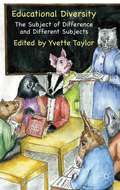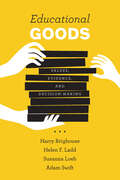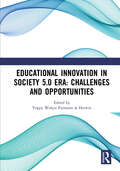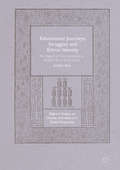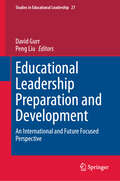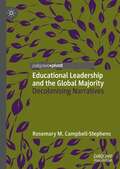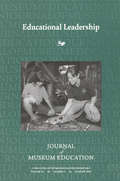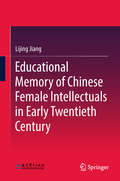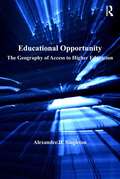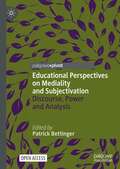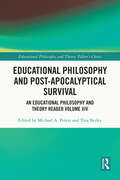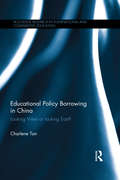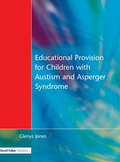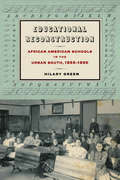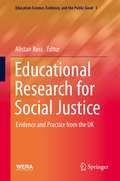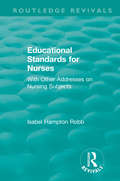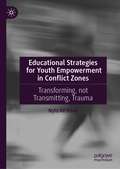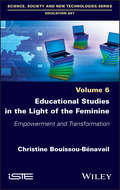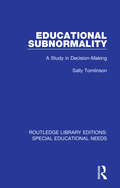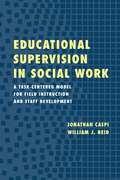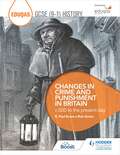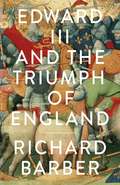- Table View
- List View
Educational Diversity
by Yvette TaylorThis collection explores the relationship between new equality regimes and continued societal inequalities, exploring change, ambivalence and resistance specifically in relation to compulsory and post-compulsory education, seeking to more fully situate the educational journeys and experiences of staff and students.
Educational Goods: Values, Evidence, and Decision-Making
by Helen F. Ladd Adam Swift Harry Brighouse Susanna Loeb“An ambitious effort that succeeds in providing a fundamentally new way to talk about and . . . think about policy choices in education.” —Jeffrey R. Henig, Teachers College, Columbia UniversityWe spend a lot of time arguing about how schools might be improved. But we rarely take a step back to ask what we as a society should be looking for from education—what exactly should those who make decisions be trying to achieve?In Educational Goods, two philosophers and two social scientists address this very question. They begin by broadening the language for talking about educational policy: “educational goods” are the knowledge, skills, and attitudes that children develop for their own benefit and that of others; “childhood goods” are the valuable experiences and freedoms that make childhood a distinct phase of life. Balancing those, and understanding that not all of them can be measured through traditional methods, is a key first step. From there, they show how to think clearly about how those goods are distributed and propose a method for combining values and evidence to reach decisions. They conclude by showing the method in action, offering detailed accounts of how it might be applied in school finance, accountability, and choice. The result is a reimagining of our decision making about schools, one that will sharpen our thinking on familiar debates and push us toward better outcomes.“Every education decision-maker—and every education researcher—would benefit from reading this book.” —David N. Figlio, School of Education and Social Policy, Northwestern University“Imaginative, informative, and unfailingly constructive.” —Michael S. McPherson, co-author of Lesson Plan: An Agenda for Change in American Higher Education
Educational Innovation in Society 5.0 Era: Proceedings of the 4th International Conference on Current Issues in Education (ICCIE 2020), Yogyakarta, Indonesia, 3 - 4 October 2020
by Yoppy Wahyu PurnomoThis book consists of a selection of papers that discuss the challenges in the increasingly complex world of education and various educational problems such as moral degradation, lack of literacy, pedagogical curriculum and innovation, educational technology. Moreover, the book provides papers that deal with educational innovation in the era of Society 5.0, with a view to discuss and resolve various social challenges, issues, and problems relating to educators, students, the dynamics of the education system, and social dynamics. The subject areas treated in this book are: Character Education in Society 5.0 Era, Multiliteracy Education in Society 5.0 Era, Early Childhood Education in Society 5.0 Era, Inclusive Education in Society 5.0 Era, Curriculum, Media and Educational Technology for Primary Education in Society 5.0 Era, Joyful and Meaningful Learning in Society 5.0 Era, and HOTS in Society 5.0 Era. This book will help educators, stakeholders, and also parents to cope with the challenges in education.
Educational Journeys, Struggles and Ethnic Identity
by Xinyi WuThis book examines how state schooling in China has economically, culturally, and ideologically had an impact on and gradually transformed a traditional Muslim Hui village in rural Northwestern China. By discussing the interpretation and appropriation of dominant educational discourse of "quality" in the rural context, it illustrates the dichotomies of poverty and prosperity, civility and uncivility, and religiosity and secularity as they are perceived and understood by teachers, parents and students. Based on an original ethnographic research conducted in a secondary school, it further touches upon Muslim Hui students' negotiations of filial, rural, and ethnoreligious identities when they struggle to seek a life of their own in the journey to prosperity. The book introduces audiences to multiple ways in which Muslim Hui students construct and negotiate identities through state schooling, especially the educational heterogeneity experienced by various Muslim youth. It also captures the changing rural-urban dynamic as state schooling continues to guide local formal educational activities as well as create tensions and confusions for both teachers and parents. Most importantly, the book challenges stereotypes about Muslim Hui students in Northwest China being assimilated into the mainstream culture by demonstrating how local Muslims live, study, pray, and fulfil the five pillars of Islam. It will be highly relevant to students and researchers in the fields of education, anthropology, sociology, and religious studies.
Educational Leadership Preparation and Development: An international and future focused perspective (Studies in Educational Leadership #27)
by Peng Liu David GurrThis collection addresses key issues in the preparation and development of school leaders across eight countries and four world areas (North America, United Kingdom, Europe and Australasia). The work offers evidence-based insights into the current and future leadership preparation and development needed for school success. The future focus extends across the coming two or more decades and challenges the reader to consider how schools will likely develop and the leadership we will need in these schools. The book comes at a time when many schools are faced with significant challenges, including enduring impacts from the pandemic, teacher shortages and the incorporation of new technologies such as generative AI. Leadership in schools has never been more important and it is timely to consider the leadership preparation and development we need now and into the future. There are chapters that address leadership from pre-service and early career teachers through to principals, providing a whole of career focus. The authors are part of the International Leadership Development Network, and use their extensive research to consider the important areas of teacher and middle leaders; leadership for equity, inclusion, and social justice; and school, community and university partnerships. It is a book that will prove useful to teachers and school leaders, system leaders, university faculty and graduate researchers.
Educational Leadership and the Global Majority: Decolonising Narratives
by Rosemary M. Campbell-StephensThis book introduces a term for our times, ‘Global Majority,’ as conceptualised within the context of school leadership. It examines the processes and impact over time of racially-minoritising up to eighty-five percent of the world’s population. The chapters illustrate how a decolonised cognitive reset from a minority to majority orientation moves practice from a place of subordination to one of agency and efficacy. By reconnecting the people of the Global Majority with their narratives and the social and historical linkages that they have always had, the book potentially contributes to a different globality; where interdependence is not driven by the economic greed of the minority, but the social and very human needs of the majority.
Educational Leadership: Journal of Museum Education 34:2 Thematic Issue (Journal of Museum Education)
by Elizabeth MaurerSponsored by the Museum Education Roundtable
Educational Memory of Chinese Female Intellectuals in Early Twentieth Century
by Lijing JiangThis book studies three female Chinese intellectuals in the first half of the 20th century, namely Feng Yuanjun, Lu Yin, and Cheng Junying, the first graduates of Beijing Female Higher Normal College, which was the first-ever national higher educational institution for women in modern China. Combining narrative inquiry, life history, oral history, and psychohistory methods, it comprehensively explores the specific developmental paths and mental processes of the post-May Fourth female intellectuals, and examines the complex interrelationships between various factors including social, academic, gender, and educational evolution in the first half of the 20th century, and the emergence of modern Chinese female intellectuals.The book is highly recommended for all scholars, undergraduate and graduate students of modern Chinese history, gender and women’s studies, history of education, history of higher education, etc., and for all those who are interested in female Chinese intellectuals.
Educational Opportunity: The Geography of Access to Higher Education (International Population Studies)
by Alexander D. SingletonWhile in recent years the burgeoning Higher Education (HE) sector has been set an agenda of widening participation, few HE institutions have strategies in place for reaching the full range of potential students most likely to benefit from (and successfully complete) their current subject and course offerings. Universities and colleges are often unsystematic in the ways in which they identify schools and colleges for outreach and widening participation initiatives, and sometimes uncoordinated in how they present the full institutional profile of subjects of study in these activities. Using innovative methodology, this book sets out some relevant aspects of the changing HE policy-setting arena and presents a systematic framework for broadening participation and extending access in an era of variable fees. In particular, the book illustrates how HE data and publicly available sources might enable institutions to move from piecemeal analysis of their intake to institution-wide strategic and geographical market area analysis for existing and potential subject and course offerings.
Educational Perspectives on Mediality and Subjectivation: Discourse, Power and Analysis (Palgrave Studies in Educational Media)
by Patrick BettingerThis open access book examines the complex relationship between education, media and power. Exploring the entanglement of education media and power structures, the contributions use various examples and case studies to demonstrate how subjectivation processes and digital structures interact with one another. The book asks which modes of subjectivation can be identified with current media cultures, how subjects deal with the challenges and potential of digitality, and how coping and empowerment strategies are developed. By addressing theoretical as well as empirical evidence, the chapters illuminate these connections and the subsequent significance for media education more widely.
Educational Philosophy and Post-Apocalyptical Survival: An Educational Philosophy and Theory Reader Volume XIV (Educational Philosophy and Theory: Editor’s Choice)
by Michael A. Peters Tina BesleyThis collection concerns educational philosophy and post-apocalyptical survival. This 14th volume in the Editor's Choice series provides insights into the philosophy of education as it relates to the concepts of civilizational collapse, discourses of decline, educating for survival amid climate emergency, cultural apocalypse and the pandemic. It is based on a series of editorials and articles published in the Educational Philosophy and Theory journal through its 55-year history. The articles, written by Editor Michael Peters and colleagues, explore the concept of global apocalypse from the educational philosophy lens. It will be of interest to scholars in philosophy of education and anyone who is working in the field of post-apocalyptic studies.
Educational Policy Borrowing in China: Looking West or looking East? (Routledge Research in International and Comparative Education)
by Charlene TanFor over a decade, Mainland China has been embarking on an ambitious nation-wide education reform ('New Curriculum Reform') for its basic education. The reform reflects China’s propensity to borrow selected educational policies from elsewhere, particularly North America and Europe. Chinese scholars have used a local proverb "the West wind has overpowered the East wind" to describe this phenomenon of ‘looking West’.But what do we mean by educational policy borrowing from the West? What are the educational policies in China's new curriculum reform that are perceived to be borrowed from the West? To what extent have the borrowed educational policies in China's new curriculum reform been accepted, modified, and rejected by the various educational stakeholders? How does culture influence the various educational stakeholders in China in interpreting and mediating educational policy borrowing from the West? How do the findings of this study on China’s education reform inform and add to the existing theories on and approaches to on cross-cultural educational policy borrowing? This book answers the above questions by critically discussing China’s policy borrowing from the West through its current reform for primary and secondary education. It presents the latest in-depth research findings from a three-year empirical study (2013-2015) with school principals, teachers, students and other educational stakeholders across China. This study offers new insights into China’s educational policy borrowing from the West and international implications on cross-cultural educational transfer for academics, policymakers and educators.
Educational Provision for Children with Autism and Asperger Syndrome: Meeting Their Needs
by Glenys JonesThe range of educational options available to a child with Autism and Asperger syndrome is broad, but choosing the right path can often be a complex task for all involved. This book provides information and advice for professionals and parents making crucial decisions about meeting the needs of children with autistic spectrum disorder. It covers the range of intellectual ability from those having severe learning difficulties to those of above average intelligence. Practical advice for those working with children from preschool to post-16 is given on: choosing the most appropriate educational placement; making decisions on which educational interventions to follow; creating an effective educational environment; working with staff and other children to maximum effect; writing effective individual education plans; working with parents and families; enabling a smooth transition between classes and stages of education; and life beyond school.
Educational Reconstruction: African American Schools in the Urban South, 1865-1890 (Reconstructing America)
by Hilary N. GreenTracing the first two decades of state-funded African American schools, Educational Reconstruction addresses the ways in which black Richmonders, black Mobilians, and their white allies created, developed, and sustained a system of African American schools following the Civil War.Hilary Green proposes a new chronology in understanding postwar African American education, examining how urban African Americans demanded quality public schools from their new city and state partners. Revealing the significant gains made after the departure of the Freedmen’s Bureau, this study reevaluates African American higher education in terms of developing a cadre of public school educator-activists and highlights the centrality of urban African American protest in shaping educational decisions and policies in their respective cities and states.
Educational Research for Social Justice: Evidence and Practice from the UK (Education Science, Evidence, and the Public Good #1)
by Alistair RossThis book presents a series of analyses of educational policies – largely in the UK, but some also in Europe – researched by a team of social scientists who share a commitment to social justice and equity in education. We explore what social justice means, in educational policy and practice, and how it impacts on our understanding of both ‘educational science’ and ‘the public good’. Using a social constructivist approach, the book argues that social justice requires a particular and critical analysis of the meaning of meritocracy, and of the way this term turns educational policies towards treating learning as a competition, in which many young people are constructed as ‘losers’. We discuss how many terms in education are essentialised and have specific, and different, meanings for particular social groups, and how this may create issues in both quantitative survey methods and in determining what is ‘the public good’. We discuss social justice across a range of intersecting social characteristics, including social class, ethnicity and gender, as they are applied across the educational policy spectrum, from early years to postgraduate education. We examine the ways that young people construct their identities, and the implications of this for understanding the ‘public good’ in educational practice. We consider the responsibilities of educational researchers to acknowledge these issues, and offer examples of researching with such a commitment. We conclude by considering how educational policy might contribute to a socially just, equitable and inclusive public good.
Educational Standards for Nurses: With Other Addresses on Nursing Subjects (Routledge Revivals)
by Isabel Hampton RobbOriginally published in 1907, this title was one of several influential textbooks on nursing written by Isabel Hampton Robb, a nursing theorist. The first superintendent of nurses at Johns Hopkins School of Nursing she helped to found key organizations for nurses in the USA. Her work in nursing has led to her being thought of as a founder of modern American nursing theory, and many of the standards she implemented are still in place today. Hampton also played a large role in advancing the social status of nursing, previously thought of a profession for the lower classes. Her work in developing a curriculum of more advanced training during her time at the Johns Hopkins School of Nursing raised the status of the profession. Nursing education today would not be what it is without the contribution of Isabel Hampton Robb.
Educational Strategies for Youth Empowerment in Conflict Zones: Transforming, not Transmitting, Trauma
by Nyla Ali KhanThis book offers fresh and exciting new directions of inquiry into the highly contentious issue of conflict resolution in South Asia. By shifting its gaze from a politics of division mired in ethno-nationalisms into a healing and restorative focus, the author moves the dialogue forward into the realm of community, healing, and shared governance. The book analyzes the major constitutional and political missteps that have led to the current situation of violence and distrust in countries such as India and Pakistan, keeping the focus on Jammu and Kashmir. This monograph will appeal to a wide range of audiences including academics, researchers, graduate students interested in South Asian politics, development, trauma studies, and peace and conflict studies.
Educational Studies in the Light of the Feminine: Empowerment and Transformation
by Christine Bouissou- BenavailFrom the theory-practice couple, there are various ways to approach educational and training issues. Intervention research, reflexive situated action and innovation are some of them. Through the analysis of the author's various experiences - professional and initial training, support for change, organizational assessment, experiential learning, project management - this book explores questions about social or professional contexts and the subjective training of actors. One of the challenges is to understand and challenge phenomena such as the development of autonomy and subsidiarity in changing academic or academic contexts. The book promotes the emergence of an ethical and resilient subjectivity. It will show that storytelling is methodological resources for research-intervention paradigms, support the development of actors and stimulate mobility. The book introduces the hypothesis of an operational principle of the feminine as fluid gender, added value to the collective intelligences of the processes of transformation of education and teaching, in terms of intergenerational transmission and in terms of transferability and Strategic activation of skills between business sectors and intellectual fields. This praxeology reconsiders organizations, temporalities, frames of reference, relaunches a reflection in action at the heart of structuration-transformation projects in governance of public action, as well as in terms of personal and collective encapacitation. The reflection opens to questions of management of conflictualities and management of the subjective, epistemological and professional economies.
Educational Subnormality: A Study in Decision-Making (Routledge Library Editions: Special Educational Needs #55)
by Sally TomlinsonFirst published in 1981. Based on a three-year study of children moving into special ESN-M education in an English city in the mid-1970s, this book questions the whole concept of mild educational subnormality by examining the criteria according to which professionals make decisions to place children within this stigmatised category. It suggests that the beliefs that the professionals hold about the behavioural, family and class characteristics of the children help to determine their judgements, and that these beliefs are related to their own position within the social structure.
Educational Supervision in Social Work: A Task-Centered Model for Field Instruction and Staff Development
by Caspi Jonathan William ReidThrough its emphasis on meeting learning objectives, the Task-Centered Model for Educational Supervision (TCS) accommodates new models of field instruction in social work, teaching accountability in fieldwork supervision and instructing novice social workers in how to be self-initiating and evaluative. The application of the TCS model in various real-life education and practice environments is illustrated by detailed case vignettes throughout the book.
Educational Supervision in Social Work: A Task-Centered Model for Field Instruction and Staff Development (Critical Perspectives On Animals Ser.)
by William J. Reid Jonathan CaspiThis book provides a comprehensive examination of instructional supervision and introduces the Task-Centered Model for Educational Supervision (TCS). It begins by reviewing the history of educational supervision in social work and principles of effective teaching practices in the field. While theories about the principles and purposes of educational supervision abound, it has proven difficult to translate these ideas into a coherent model of supervisory practice. Educational Supervision in Social Work answers that need, presenting in detail TCS, an ordered series of discrete activities that supervisors and supervisees follow during and between supervision meetings. Designed to promote the continuous attainment of learning and practice objectives, TCS accommodates new models of field instruction, addresses common accountability concerns in social work supervision, and teaches practitioners how to be self-initiating and evaluative. Focusing on the practical implementation of TCS, Caspi and Reed have included detailed case vignettes throughout the book that provide concrete examples of putting theory into practice. Both supervisors of interns and staff as well as supervisees will find TCS a helpful tool in the supervisory process.
Educations in Ethnic Violence
by Matthew LangeIn Educations in Ethnic Violence, Matthew Lange explores the effects education has on ethnic violence. Lange contradicts the widely held belief that education promotes peace and tolerance. Rather, Lange finds that education commonly contributes to aggression, especially in environments with ethnic divisions, limited resources and ineffective political institutions. He describes four ways in which organized learning spurs ethnic conflicts. Socialization in school shapes students' identities and the norms governing intercommunal relations. Education can also increase students' frustration and aggression when their expectations are not met. Sometimes, the competitive atmosphere gives students an incentive to participate in violence. Finally, education provides students with superior abilities to mobilize violent ethnic movements. Lange employs a cross-national statistical analysis with case studies of Sri Lanka, Cyprus, the Palestinian territories, India, sub-Saharan Africa, Canada and Germany.
Eduqas GCSE (9-1) History Changes in Crime and Punishment in Britain c.500 to the present day
by R. Paul Evans Rob QuinnExam board: EduqasLevel: GCSESubject: HistoryFirst teaching: September 2016First exams: June 2018Endorsed by EduqasHelp every student to achieve their best, with bespoke support for Eduqas GCSE History from the leading History publisher for secondary schools.Structured around the key questions in the 2016 specification, this book:> Develops in-depth subject knowledge through clear and detailed coverage of the important themes, perspectives and developments> Builds students' historical skills and thinking as they progress through a range of activities and questions> Prepares students for assessment by providing step-by-step guidance and model answers for each question type> Increases understanding and enjoyment by including a rich variety of source material that brings different periods to life
Eduqas GCSE (9-1) History Changes in Crime and Punishment in Britain c.500 to the present day
by R. Paul Evans Rob QuinnExam board: EduqasLevel: GCSESubject: HistoryFirst teaching: September 2016First exams: June 2018Endorsed by EduqasHelp every student to achieve their best, with bespoke support for Eduqas GCSE History from the leading History publisher for secondary schools.Structured around the key questions in the 2016 specification, this book:> Develops in-depth subject knowledge through clear and detailed coverage of the important themes, perspectives and developments> Builds students' historical skills and thinking as they progress through a range of activities and questions> Prepares students for assessment by providing step-by-step guidance and model answers for each question type> Increases understanding and enjoyment by including a rich variety of source material that brings different periods to life
Edward III and the Triumph of England: The Battle of Crécy and the Company of the Garter
by Richard BarberA fascinating recreation of the world of one of England's most charismatic monarchs, from award-winning author and historian Richard BarberThe destruction of the French army at Crécy in 1346 and the subsequent siege and capture of Calais marked a new era in European history. The most powerful, glamorous and respected of all western monarchies had been completely humiliated by England, a country long viewed either as a chaotic backwater or a mere French satellite.The young Edward III's triumph would launch both countries, as we now know, into a grim cycle of some 90 years of further fighting ending with English defeat, but after Crécy anything seemed possible - Edward's claim to be King of France could be pressed home and, in any event, enormous rewards of land, treasure and prestige were available both to the king and to the close companions who had made the victory possible. It was to enshrine this moment that Edward created one of the most famous of all knightly orders, the Company of the Garter.Barber writes about both the great campaigns and the individuals who formed the original membership of the Company - and through their biographies makes the period tangible and fascinating. This is a book about knighthood, battle tactics and grand strategy, but it is also about fashion, literature and the privates lives of everyone from queens to freebooters. Barber's book is a remarkable achievement - but also an extremely enjoyable one.Reviews:'Barber [has an] infectious passion for and deep knowledge of his subject matter ... elegant prose and rigorous historical analysis ... a valuable and thorough addition to the body of work on this most impressive of English monarchs' Sunday Times'In Edward III and the Triumph of England [Barber] has written the kind of book that the king would have enjoyed: full of battles, glitter and ceremony ... he has an original eye and an elegant pen' Jonathan Sumption, Literary Review'Barber share's his hero's love of chivalry ... The book sparkle[s] with some of Edward's own glitz' Telegraph'This absorbing book is layered rather than linear, sifting with uncommon sensitivity through challenging sources to test the boundaries of what we can and cannot know ... We discover the complexity of the world in which Edward and his commanders lived' Helen Castor, The TimesAbout the author:Richard Barber has had a huge influence on the study of medieval history and literature, both as a writer and as a publisher. His major works include The Knight and Chivalry (winner of the Somerset Maugham Award), Edward Prince of Wales and Aquitaine, The Penguin Guide to Medieval Europe and The Holy Grail: The History of a Legend. He lives in East Anglia.
